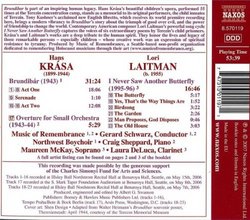Amazon.com Among the recently discovered works by Czech-Jewish composers written at the concentration camp Terezín (a way-station to the Nazi gas chambers) was the children's opera Brundibár (Czech for "bumblebee") by Hans Krása, born in Prague in 1899 and murdered in Auschwitz in 1944. Performed by the camp's children 55 times - with the cast changing as the performers were deported and killed - it became a symbol of the prisoners' undaunted creativity. Assessing the purely musical quality of the Terezín works is almost impossible in view of the wrenching circumstances of their inception and the composers' still developing talents and creative powers. The miracle is that they exist at all. The music of Brundibár is a mix of pleasant pop tunes, jazz, patter songs, a bit of Stravinsky and a lot of Kurt Weill. The singers speak more than they sing; the ensembles, from duets to chorus, are almost entirely in unison. The orchestration (here as well as in the fast, rhythmically pungent Overture) is colorful and inventive. The story: a brother and sister try to collect money to buy their sick mother milk by singing and dancing in the street but are drowned out and scared away by the organ-grinder Brundibár. A sparrow, a cat, and a dog suggest that there is strength in numbers. When passing schoolchildren join their songs, they attract attention and donations. The moral: ask for help, take a stand, don't submit to bullying! Unfortunately, the famous Tony Kushner's English adaptation of the libretto is distressingly infelicitous; he even misspells "Aninka," the sister's name. The performance, using adult voices, is excellent. The settings by the American composer Lori Laitman (b. 1955) of five poems by children murdered in the death camps capture the mood and character of the texts with uncanny empathy, from bitter humor and defiance to dreamy tenderness, soaring lyricism, and heartbreaking sadness. This is a new arrangement for soprano and clarinet (another version with bassoon was performed in New York in 2001 by the Festival Chamber Music Society). --Edith Eisler


 Track Listings (23) - Disc #1
Track Listings (23) - Disc #1